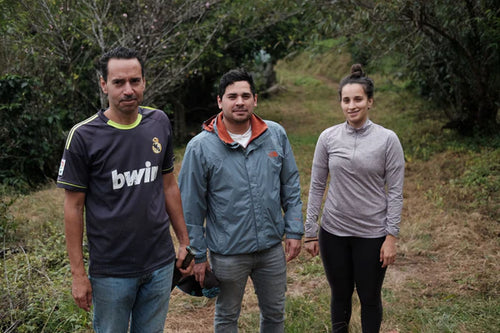We're so excited to offer this new coffee via our good friends at Paso Paso, the farmer-owned roastery and importer based out of Germany. We love their philosophy of supporting farmers to own as many steps of the coffee production process as possible (including the lucrative step of coffee roasting!) which builds towards a sustainable future for coffee farmers all over the world.
Roble Negro is one of the five farms that owns that roastery and we are really excited that we will be releasing coffees from all five of those farms throughout the year (and in years to come). Roble Negro is owned by Jorge Vasquez and his niece and nephew Dani and Alex who we had the absolute pleasure of hanging out with last year at world of coffee in Copenhagen. It is a farm with incredible sustainability and conservation at it's core which is all the more reason to support what they are doing. It helps that the coffee is also delicious with notes of Blood Orange, Caramel and Honey.
Roble Negro coffee is processed at Jorge Vasquéz Ureña’s Roble Negro micromill. The mill and his coffee farm, Finca Cedral Alto, are located in the town of Aserrí in Costa Rica’s Tarrazú region about 45 minutes outside of the capital of San José. The name Roble Negro means “black oak” and Cedral Alto means “high cedar grove”. These names indicate the importance of environmental preservation to Jorge and his coffee production. The farm is filled with natural springs and freshwater sources, which the forested areas protect and keep clean, and is situated at the transition between the Pacific side of the country and the Central Valley region, spanning 1750–2000 meters above sea level.
Jorge grew up playing football with his cousins on the farms around Aserrí where their parents worked picking coffee. He graduated from college with a degree in accounting and worked for Costa Rica’s Banco Nacional for 21 years, serving as a branch manager for the last 11 years of his time there. Jorge now owns a recycling company, Compañía de Reciclaje Ecológico, which he founded in response to the country’s pollution levels. The recycling company is an extension of his belief in taking care of the natural world around him. Compañía de Reciclaje Ecológico has 14 employees, creates another 20 indirect jobs, and annually processes 2,000 tonnes of materials like cardboard, paper, wood, plastics, metals, and more.
Jorge bought Finca El Cedral in 2007 from Don Fernando Monge. One of Jorge’s first concerns for Finca El Cedral Alto was to protect the six water sources on the property. The waterways form the beginning of the Rio Jorco River and serve as drinking water aquifers for the nearby towns of Cedral Abajo, Vuelta de Jorco, and Acosta, as well as acting as irrigation sources for surrounding farms. The farm is dotted with stunning waterfalls thanks to these water sources— a reminder of the importance and power of freshwater to people, flora, fauna, and agriculture.
Cedral Alto also contains fruit trees planted between the coffee plants, including orange, peach, sweet lemon, plantain, soursop, and avocado, which provide for both people and other animals. The farm cultivates Red and Yellow Catuai, and has a nursery of “Criollo” seedlings collected from trees that survived from over 50 years ago when that was the primary cultivated variety. New seedlings are planted at the beginning of the rainy season, usually in May and June, and require extensive care through the first year of their transition as their root systems form and they develop foliage for the transition from the nursery to the open field. Climate change has made this process though, by splitting the rainy season and increasing the number of dry months while reducing total rainfall. This changes both the development of the plants, as well as the way that they producers can work with them.
In line with Jorge’s commitment to sustainability, Roble Negro removes all weeds by hand, doesn’t use herbicides, and avoids agrichemicals. Instead, they use microorganisms harvested from the humus layer of the forest floor to create non-toxic applications to control insects and natural diseases like leaf rust, as well as to facilitate nutrient absorption. Pruning and preventative herbicide/insecticide applications are also done by hand and use the “melasa” byproduct of a sugarcane mill as a natural application medium.
Jorge’s Roble Negro micromill is well known for its high-quality standards and thoughtful sustainability practices. Operations at the mill aim to reduce the use of nonrenewable resources like water and electricity, repurpose waste products into natural fertilizers, and even ensure that the GrainPro used for packing and shipping coffee is reused or recycled by the mill’s global partners.
This lot of Catuai coffee underwent Natural processing at Roble Negro. Harvested cherries are dried for 20–30 days to reach 11% humidity. While being dried, the cherries are turned every three hours to ensure even drying. Dried cherries are rested in the mill’s warehouse for at least two months prior to being milled and prepared for export.
Elevation: 1874 MASL
Varietal: Catuai
Cup score: 86
Price paid per kg: £11.27
Process: Black Honey


